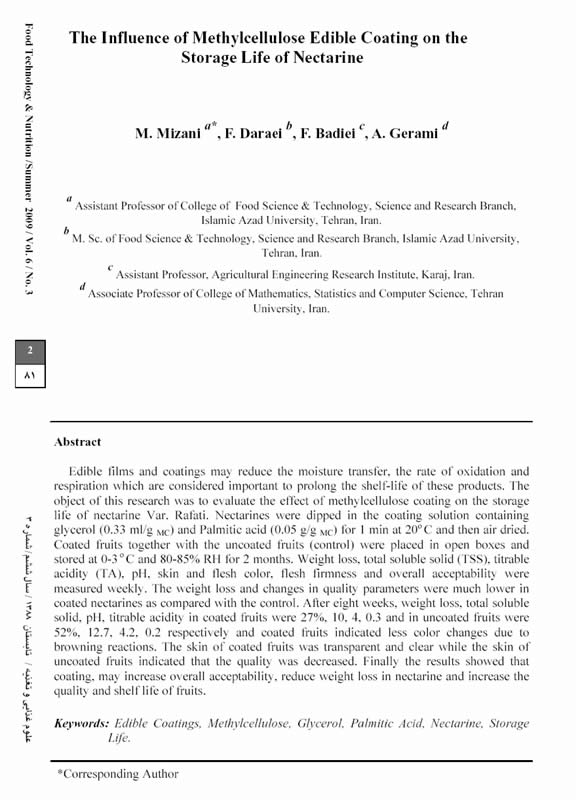 Influence of Methylcellulose Edible Coating on the Storage Life of Nectarine
Influence of Methylcellulose Edible Coating on the Storage Life of NectarineMizani, M; Daraei, F; Badiei, F; Gerami, A; 2009; Influence of Methylcellulose Edible Coating on the Storage Life of Nectarine; Food Technology & Nutrition, Vol. 6, No. 3, 2-11.
Abstract: Edible films and coatings may reduce the moisture transfer, the rate of oxidation and respiration which are considered important to prolong the shelf-life of these products. The object of this research was to evaluate the effect of methylcellulose coating on the storage life of nectarine Var. Rafati. Nectarines were dipped in the coating solution containing glycerol (0.33 ml/g MC) and Palmitic acid (0.05 g/g MC) for 1 min at 20°C and then air dried. Coated fruits together with the uncoated fruits (control) were placed in open boxes and stored at 0-3 °C and 80-85% RH for 2 months. Weight loss, total soluble solid (TSS), titrable acidity (TA), pH, skin and flesh color, flesh firmness and overall acceptability were measured weekly. The weight loss and changes in quality parameters were much lower in coated nectarines as compared with the control. After eight weeks, weight loss, total soluble solid, pH, titrable acidity in coated fruits were 27%, 10, 4, 0.3 and in uncoated fruits were 52%, 12.7, 4.2, 0.2 respectively and coated fruits indicated less color changes due to browning reactions. The skin of coated fruits was transparent and clear while the skin of uncoated fruits indicated that the quality was decreased. finally the results showed that coating, may increase overall acceptabilit, reduce weight loss in nectarine and increase the quality and shelf life of fruits.
Keywords: Edible Coating, Methylcellulose, Glycerol, Palmitic Acid, Nectarine, Storage Life.
Visit: 4243
Abstract: Edible films and coatings may reduce the moisture transfer, the rate of oxidation and respiration which are considered important to prolong the shelf-life of these products. The object of this research was to evaluate the effect of methylcellulose coating on the storage life of nectarine Var. Rafati. Nectarines were dipped in the coating solution containing glycerol (0.33 ml/g MC) and Palmitic acid (0.05 g/g MC) for 1 min at 20°C and then air dried. Coated fruits together with the uncoated fruits (control) were placed in open boxes and stored at 0-3 °C and 80-85% RH for 2 months. Weight loss, total soluble solid (TSS), titrable acidity (TA), pH, skin and flesh color, flesh firmness and overall acceptability were measured weekly. The weight loss and changes in quality parameters were much lower in coated nectarines as compared with the control. After eight weeks, weight loss, total soluble solid, pH, titrable acidity in coated fruits were 27%, 10, 4, 0.3 and in uncoated fruits were 52%, 12.7, 4.2, 0.2 respectively and coated fruits indicated less color changes due to browning reactions. The skin of coated fruits was transparent and clear while the skin of uncoated fruits indicated that the quality was decreased. finally the results showed that coating, may increase overall acceptabilit, reduce weight loss in nectarine and increase the quality and shelf life of fruits.
Keywords: Edible Coating, Methylcellulose, Glycerol, Palmitic Acid, Nectarine, Storage Life.
Visit: 4243
design by: webcandy.ir
